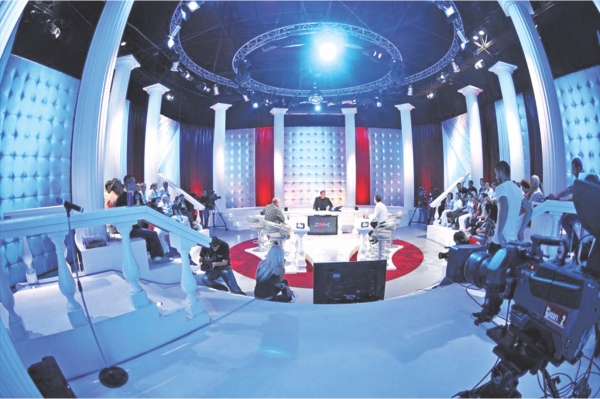| Home - Back Issues - The Team - Contact Us |
 |
| Volume 11 |Issue 25| June 22, 2012 | |
|
|
Perceptions Talk Shows on the Spot Shah Husain Imam Talk shows are hogging the news headlines, both for the right and wrong reasons. Take the case of a pre-election talk show over a TV channel in Greece, broadcast live recently. Pro-right Rena Dorou accused MP Ilias Kasidiaris of having a hand in a 2007 armed robbery incident; the enraged MP threw a glass of water on the face of the lady politician. At this, Communist party member Liana Kanneli MP hurled a newspaper at Kasidiaris. Result: Kasidiaris landed three slaps on the face of Rena Dorou, the woman politician thereby stirring up a gender furor. This, in the cradle of democracy. We are not aware of participants of any local talk show coming to blows but the Greek incident must have been the nearest to it. Barring a few notable exceptions, talk shows in Bangladesh sometimes do go ballistic and even bitter but hardly effective as disseminators of information and reflectors of public opinion. These have had a fair share of criticism, sometimes even censoring. But that's the freedom of media question meriting a separate treatment in a broader perspective. For the present, let me highlight the apple-and-orange mixed bag of talk shows; several of them end up being time-fillers rather than educative in the value-added sense. They are mostly a repeat of what is already known or talked about in various forums from time to time. Squeezed lemon with no juice to drip. The moderator, eager to steer the talks to a conclusion, is prone to place leading questions rather than make searching queries. Sometimes, closed questions are asked courting a yes or no answer.
In not a few cases the compere turns into a talker himself/herself stringing out a statement and asking for the opinion of the invited talker on his/her observation. Usually the host is supposed to keep a low profile inducing others to talk instead of calling the shots, so to speak. The usual format is an interface between politicians of opposite camps or proponents of divergent views on an issue. But sometimes a composite group of stakeholders would be brought on the show to facilitate a comprehensive understanding of a burning question. It is this format that has often proved useful. The interjections of the moderators in taking calls or inserting their own words sometimes rudely break the train of thought of a participant on the microphone. The interloping conversations, if you will, are as frequent as the packaging of advertisements into the primetime programmes. It goes without saying that the interspacing of elements should be more balanced and audience-friendly. With a dysfunctional parliament, vociferous ruling party people and a resentful opposition, talk shows have the potential to become a relieving feature of audiovisual enlightenment and entertainment. Topicality can be boring, if not presented with a fresh creative angle thinking out of the box. Talks become shouting matches between politicians, perhaps much to the delight of their respective supporters; the general audience are simply put off by the antics. A bit of chastening comes as a balm to the heated exchange when one participant points to the other that he did not interrupt the latter while he was speaking, so the other is only expected to let him have his say. "Let me finish," he will insist on the interposing opponent, thereby somehow get to make his point. Interestingly, the cross-referencing of each other's track records with comparable blemishes fleshed out from their legacies usually has a silencing effect on the more aggressive of the two. Now comes no less a person than the Prime Minister in the picture. It appears she has turned pretty sensitive to talk shows lately. She phonetically translated talk as 'sour' in Bangla and wonders why the talk cannot be 'sweet' as well. "In the print media and over talk shows we have one picture of the country, but in the villages we see an entirely different spectacle," laments the Prime Minister. In an Awami League grassroots' meet, she said, "Since we came to power mass media has been enjoying full freedom. Truth or untruth, they are writing ceaselessly. It seems unless they write anything against the government they cannot digest their food. This is the reality. But they forget that this is harming the country; yet, we don't put fetters on them." All we have to say is objective, credible and independent media is a reliable source of information for her and that if she is tolerant and heedful of constructive criticism she will stand to benefit more than she would otherwise. We can guarantee her that. No one is infallible, neither a government functionary nor a media scribe but they can be constructive if they want to. Taking criticism with praise is the rule of the game. The writer is Associate Editor, The Daily Star.
Copyright
(R) thedailystar.net 2012 |
